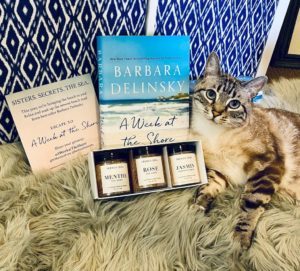Venture Out Of Quarantine With Me
Hi, everyone! It’s time to venture back out into the world which is a little scary, right? That’s where we are in Northern California – like turtles starting to stick our heads out just a little bit. We’re starting to visit family, actually going to the grocery store, and getting haircuts for everyone – a good thing since we’re all looking a bit like muppets.
Though with the latest numbers in California, who knows where we’re headed. It’s terrifying. Masks, masks, masks, wash, wash, wash.
In case you missed the last two installments of my blog posts, you can catch up by clicking here for week one and here for week two.
This week I’m thrilled to share an insider look into the mind of author Barbara Delinsky, who just dropped her latest hot read, A Week At The Shore, which immediately hit the New York Times bestseller list – her twenty-third novel to do so.

Both Pip and I enjoyed A Week At The Shore immensely.
Full disclosure: Barbara is one of my BadRedhead Media clients (and I’m supremely grateful for that!). I handle her social media, street team, blog and book review optimization, and a good deal of her book promotion.
After finishing the book (which I loved), I had a few questions for Barbara about her writing style, so I emailed them to her and she was kind enough to respond.
A Week At The Shore by Barbara Delinsky Interview
Q: I notice you don’t only use ‘she said’ for dialogue, which I personally love, though as I’m sure you know well, it’s a DEBATE.
A: I’ve actually spent a lot of time thinking about this. I don’t use half as many other words (“she exclaimed,” “she intoned,” or “she declared”) as much as I used to. Yes, there’s something to be said for simple and real. That said, the constant monotony of “she said” gets boring, so I try to find a comfortable balance. This actually ties in with your next question.
Sometimes, the sub for “she said” can express emotion, as in “she cried,” or “she dare say,” or “she whispered.” So it does add something. Still, though, not quite the “show, not tell” rule (see more on that below).
Q: Also, the ‘show, not tell’ rule regarding feelings. You sometimes say what emotions Mallory {Ed. the main character} feels (at times). If I wrote that in my creative writing classes, my teacher would’ve jumped out a window, yet it works. Again, love. All this ‘do this, not that’ advice can be confusing for writers, regardless of genre, myself included.
A: Yes, it does work at times, at least, for me. But then, I never took a creative writing class, so maybe I just don’t know how to show rather than tell. Here, too, I think you have to be guided by common sense. If by “show,” you mean having a character “start to huff and puff,” to show upset, rather than simply to “cry in alarm,” I’d opt for the simpler.
The image of huffing and puffing will distract the reader from what you’re saying. IMHO, the “show, not tell” rule applies to larger things, like rather than saying “her husband could be nasty,” saying something like, “her husband could see her scrubbing the dinner dishes and tell her she was made for this.” So, it’s really giving an example of what you’re saying in summary. Does that make sense?
Q: Yes, absolutely. Also, you write about the past in the present tense – I do this with memoir and blog posts, and prefer to read books or even blog posts/articles written this way. It’s more immediate. When I work with writers in my workshops, they tend to write in the past tense. I haven’t read all of your other books, so I wonder if you do this with all your books?
A: I’m actually not even aware of writing about the past in the present tense, unless it’s a bonafide flashback, in which case it would be in the present. I’ve been experimenting with different tenses book to book. My last book, BEFORE AND AGAIN, was in the first-person past tense, A WEEK AT THE SHORE is in first person present tense.
The latter took some getting used to. And it’s possible that I botched the flashback tenses simply because I’m not ultra-experienced with first-person present. My editor didn’t catch or change anything, though. I agree with you. There is an immediacy to first-person present tense that is nice. That said, the new book I’ve started is in first-person past tense.
Q: Basic skills – I get it. This is how new writers learn. You aren’t new (after writing hundreds of books and stories), so you break rules – is that it?
A: I’m not “schooled” in writing, so I don’t know I’m breaking the rules!!
Q: You’re so skilled, Barbara. Your characters are intricate and layered. This book is a CLASS in writing. Do you ever think about young writers reading your work and learning from you?
A: You are too kind, Rachel. Seriously. I’m just muddling along, basically doing what works for me as a reader, since I have no formal training. Truly. Now I’m just enjoying it. 



